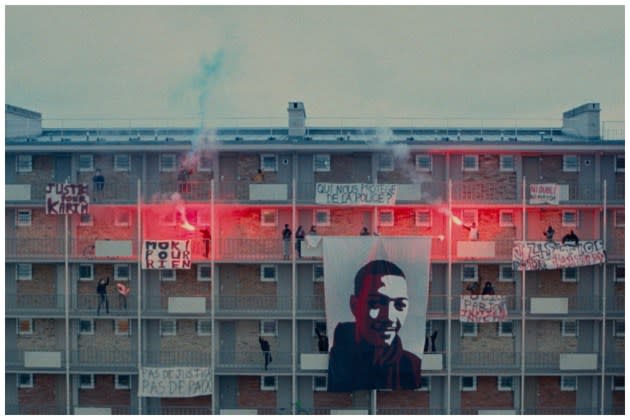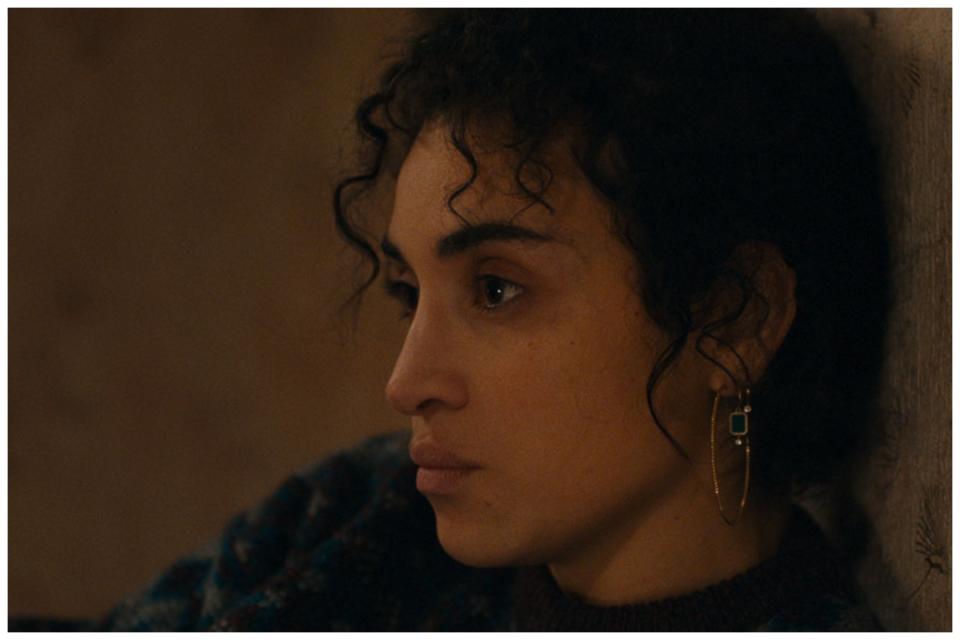French Director Mehdi Fikri & Singer Camélia Jordana Talk Collaboration On Police Violence Drama ‘After The Fire’ – Toronto

French director Mehdi Fikri spent a decade working as a reporter covering social conflict and the issues of police violence and justice in France’s notoriously deprived out-of-town suburbs.
What he learned and saw during this time now feeds into his work as a filmmaker.
More from Deadline
Spike Lee Reflects On 9/11 At TIFF, Shows Episode From HBO Docuseries 'NYC Epicenters 9/11-2021 1/2'
First feature After The Fire, which debuts in Toronto’s Discovery line-up, follows Malika, a French woman of North African descent, living in an outer suburb of the city of Strasbourg, who seeks justice after her younger brother dies in suspicious circumstances after being stopped by the police.
“I was born and grew up in Saint Denis in northern Paris, which has the reputation for being one of the most disadvantaged places in the entire Paris region,” says Fikri.
“The question of police violence has been a political issue in France for years and is something that has touched me personally as a young man growing up where I did and then reporting about the issue for 10 years.”
“The story is inspired by reality, but it’s not a documentary. I wanted it to be a fiction with a strong dramatic quality, with my references being films like Steve McQueen’s Hunger or Pablo Larrain’s No and Jackie, films that deconstruct political events with strong direction.”
While the premise is sombre, Fikri gives a positive aspect to the story through the protagonist’s political awakening and emancipation.
At the same time as going up against the police force and justice system, she also finds herself navigating local politics and contradicting the traditions of her family when she demands the burial be delayed, so as to allow for an independent autopsy.
“I wanted a story that was political and intimate at the same time… It’s also a story about family loyalty. That a universal theme that touches everyone whatever their background. What does it mean to stand up for your family and be coherent in the face of a past hurt,” says Fikri.
“Things get complicated because while my heroine is acting for her family, she finds herself going up against it… She pays a personal price for this fight, but it’s a price she is willing to pay to be able to look herself in the mirror and know she did the right thing.”

Camelia Jordana After The Fire
Singer and actress Camélia Jordana plays Malika in a cast also featuring rapper and actor Sofiana Zermani (No Limit), Samir Guesmi (For Our Country, Our Brothers), Sofian Khammes (The Swarm) and newcomer Sonia Faidi.
“She took the film to another level, with her intelligence and generosity,” says Fikri.
Jordana was attracted to the hard-hitting subject-matter of the film.
The French-born singer, who was born to French parents of Algerian descent, first rose to fame as contestant on the popular TV talent show Nouvelle Star in 2009.
She has become increasingly outspoken about racism and police violence in recent years.
Her third album Lost featured references to the Paris Massacre of 17th October 1961, in which an estimated 200 to 300 men of Algerian origin died at the hands of the police, and the death of Freddie Gray in Baltimore Police Department custody in 2015.
“Police violence is a subject that has been at the centre of my life. I’ve been talking about it in my music and my songs for five, six years now,” says Jordana.
The role marks her weightiest to date, after credits that include comedy-drama Le Brio, opposite Daniel Auteuil and Emmanuel Mouret’s comedy-romance The Things We Say And The Things We Do.
“I was also interested by the character,” she says. “She’s a woman who becomes the leader of a cause, but she doesn’t really want this destiny. She refuses it at the beginning, but in the end, she doesn’t have a choice. It becomes her whole life.”
The drama, which is produced by Michael Gentile’s The Film, will be released in France on November 15 by Bac Films. Goodfellas is handling international sales.
The theatrical launch follows in the wake of a flare-up in the debate over police violence following the shooting dead of 17-year-old Nahel Merzouk in the suburb of Nanterre on the edge of central Paris in late June, after he fled a routine traffic stop.
“We shot the film from last November to mid-December and were in the middle of finishing the post-production when it happened. It shook the whole team,” says Fikri.
After The Fire is one of two French films showing in Toronto this year touching on the issue of police violence, alongside Ladj Ly’s Les Indésirables, which was also conceived many years ago.
“I’ve been working on this subject for years, but many of the crew members weren’t familiar with this reality that caught up with us in post-production,” says Fikri. “While it was very upsetting, it also reinforced our desire to make a positive film, in which the protagonist goes through something difficult and painful but grows in the process.”
A coda at the end of the film, recalls Merzouk as well as a number of other young men who have died at the hands of French police officers over the past decade.
Jordana hopes the film will connect with people who have lost family members in this way.
“I hope we can touch the people we are talking about, so they can see that they’re not alone, that we care, that we know their story and that we’re telling their story,” she says.
“I’m talking about the victims’ families. The way it’s treated in the media is rarely fair. Secondly, I hope that people in the suburbs are going to feel they’re not alone, and thirdly, most importantly, I hope that people who’re not personally touched by these stories and do not believe this actually happens, are going to have the curiosity to go to see it.”
Best of Deadline
Venice Film Festival 2023 Photos: The Red Carpet Premieres & Closing Ceremony Winners
Venice Film Festival @ 80: Memorable Moments & Stars 1932-2023 - Photo Gallery
Sign up for Deadline's Newsletter. For the latest news, follow us on Facebook, Twitter, and Instagram.

 Yahoo News
Yahoo News 
